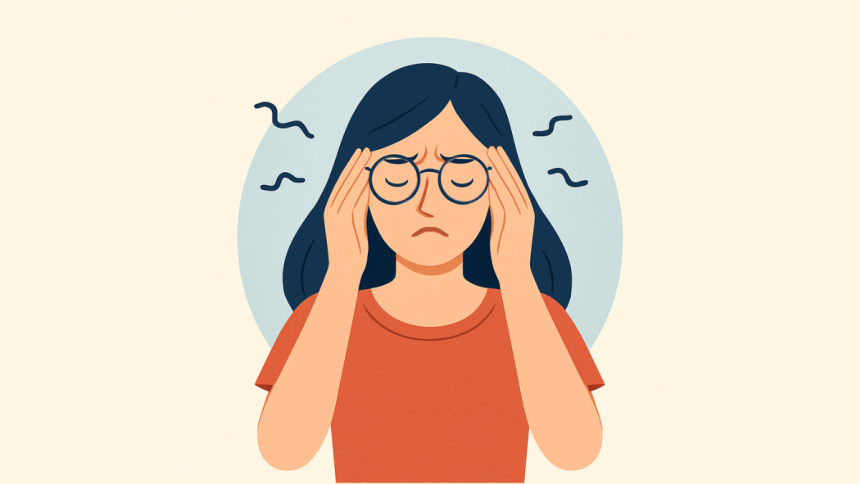It’s Not Always in Your Head
You sit down to read. A few lines in, your mind drifts. You backtrack, reread, try to focus—but the words blur, your attention wavers, and your eyes start to ache. Maybe you chalk it up to stress, fatigue, or a wandering mind. Maybe you’ve even wondered: Do I have attention issues?
But what if the problem isn’t cognitive at all?
For many people—students, professionals, avid readers, and reluctant ones alike—difficulties with focus and reading comprehension aren’t rooted in the brain. They begin with the eyes. And more specifically, with subtle visual challenges that often go undiagnosed because the symptoms don’t look like classic “vision problems.”
We’ll explore the powerful, often overlooked link between your visual system and your ability to concentrate, read comfortably, and retain what you’ve just read. If you’ve been struggling to focus and can’t quite explain why, your eyes might have more to say than you think.
The Vision–Focus Connection: What Most People Don’t Realize
We tend to think of reading and concentration as brain-based tasks—and they are, to a point. But the brain relies heavily on clear, consistent input from the eyes. If that input is even slightly disrupted, the brain has to work harder to process what it sees. That extra effort can lead to mental fatigue, reduced focus, and poor comprehension.
This is where things get tricky: you can have perfect 20/20 vision and still have a vision problem.
In children, these symptoms are often misread as ADHD or learning delays. In adults, they’re usually blamed on screen fatigue or stress. In both cases, vision is rarely the first thing we check—even though it should be.
Once these subtle issues are identified, many are highly treatable. But they often go unnoticed without a comprehensive eye exam—because they don’t show up on a standard eye chart.
Real-World Signs It Might Be Your Eyes
Most people expect vision problems to show up as obvious blur or trouble seeing far away. But when it comes to focus and reading, the signs are often more subtle—and easy to misinterpret.
Signs your eyes may be overworked
You reread the same sentence over and over
You’re not distracted—you’re trying to process what your eyes just skimmed past. Poor eye tracking or fatigue can make it harder to move smoothly from line to line.
Reading makes you unusually tired
If a short chapter feels like mental exhaustion, your visual system may be struggling to keep up—especially if you feel fine during other tasks.
You avoid reading unless you have to
It’s not about motivation or interest. If your eyes feel strained, your brain learns to avoid the discomfort by simply tuning out.
You get headaches in the same spot after reading
Particularly behind the eyes or around the temples—these can be signs of eye muscle strain or undiagnosed focusing issues.
You blink, squint, or rub your eyes frequently
Dryness, screen glare, or focusing difficulties often show up as physical discomfort before visual blur becomes obvious.
You retain less of what you read
The information is there—but when your eyes are fatigued, your brain doesn’t get the full picture. Comprehension takes a hit.
These symptoms often get brushed off as “just tired,” or worse, as a personal failing. But they’re often functional vision problems—and they’re treatable.
How Eye Exams Can Reveal the Real Issue
The good news? You don’t have to guess whether your eyes are affecting your ability to focus. A comprehensive eye exam can uncover what a standard vision test often misses.
While a typical eye chart measures how clearly you see letters from a distance, a full exam looks at the function of your visual system. That includes:
- Eye teaming – how well your eyes work together as a pair
- Focusing ability – how quickly and accurately you shift between near and far
- Tracking – whether your eyes move smoothly across lines of text
- Visual endurance – how your eyes perform over extended periods, like during reading or screen use
- Tear film quality and eye surface health – which affect comfort and clarity
These tests don’t just help with diagnosing blur—they help explain why reading feels harder than it should, even if everything seems fine on the surface.
In places like Utah, individuals dealing with these challenges often find clarity through experienced eye doctors Ogden Utah who specialize in identifying subtle visual barriers to focus and comprehension.
And for those in Virginia, a well-rounded eye exam Alexandria can reveal underlying strain that mimics attention issues—offering insight and solutions that go far beyond corrective lenses.
When your eyes are properly evaluated, the solutions can be surprisingly simple: specialized lenses, visual therapy, or even minor adjustments in screen setup and reading posture. The hard part isn’t the fix—it’s realizing your vision needed support in the first place.
Why This Matters More in a Digital World
We’re reading more than ever—but we’re doing it differently.
Between smartphones, tablets, laptops, and e-readers, our eyes now spend hours each day locked on digital text. Unlike printed pages, screens emit blue light, create visual glare, and demand rapid shifts in focus and contrast. Add in scrolling, pop-ups, and multitasking, and the cognitive load grows even heavier.
For the visual system, this creates a perfect storm:
- Less blinking leads to dry eyes
- Tiny font sizes make focusing harder
- Continuous scrolling disrupts smooth eye movement
- Prolonged exposure fatigues eye muscles faster than print reading ever did
This isn’t just a comfort issue—it’s a comprehension issue, too. Studies have shown that people often retain less information when reading on screens, especially when their eyes are tired or struggling to maintain focus. And in children, the effects can be even more pronounced.
If someone’s always reading online—for school, work, or leisure—and struggling to stay engaged, the cause might not be attention span. It might be vision strain, hiding in plain sight.
The shift to digital has changed how we read. It’s time we changed how we support the eyes doing that reading.
What to Do If You Suspect It’s Your Eyes
If reading feels harder than it used to—if your focus slips, your eyes feel tired, or you’re simply not absorbing what you read—it’s worth considering that your vision might be part of the equation.
The next step doesn’t need to be complicated. Here’s where to start:
- Schedule a comprehensive eye exam – Be clear that you’re experiencing difficulty focusing, especially while reading. Not all exams are created equal, so it helps to mention the specific issues you’ve noticed.
- Track your symptoms – Make a quick note of when you struggle the most. Is it with printed books, screens, at night, or during long reading sessions? This information helps your optometrist look beyond the standard tests.
- Advocate for functional testing – If you’re still told your vision is “fine” but you’re struggling, ask whether eye teaming, tracking, or focusing efficiency were evaluated. These are often missed in routine screenings.
- Don’t assume it’s just you – Many bright, capable readers—from kids to professionals—quietly adapt to visual strain because they think it’s normal. It’s not. And it’s fixable.
Whether you’re a lifelong reader or someone who’s always found it a chore, comfort and clarity matter. A properly trained optometrist can help uncover what’s standing in your way—and often, the solution is easier than you expect.
Clarity Starts with Seeing Clearly
When reading feels like a struggle, we often look inward—blaming distractions, stress, or a lack of discipline. But sometimes, the answer isn’t in your habits. It’s in your eyes.
Subtle visual challenges can mimic attention issues, slow down comprehension, and turn reading into a draining experience. Left unaddressed, they don’t just affect how well you read—they affect how confidently you learn, communicate, and retain information.
The solution doesn’t have to be complicated. A single exam could shift your understanding of the problem—and open the door to easier, more focused reading.
Because clarity doesn’t just come from turning down the noise.
It starts by making sure you’re truly seeing what’s in front of you.
Lynn Martelli is an editor at Readability. She received her MFA in Creative Writing from Antioch University and has worked as an editor for over 10 years. Lynn has edited a wide variety of books, including fiction, non-fiction, memoirs, and more. In her free time, Lynn enjoys reading, writing, and spending time with her family and friends.















